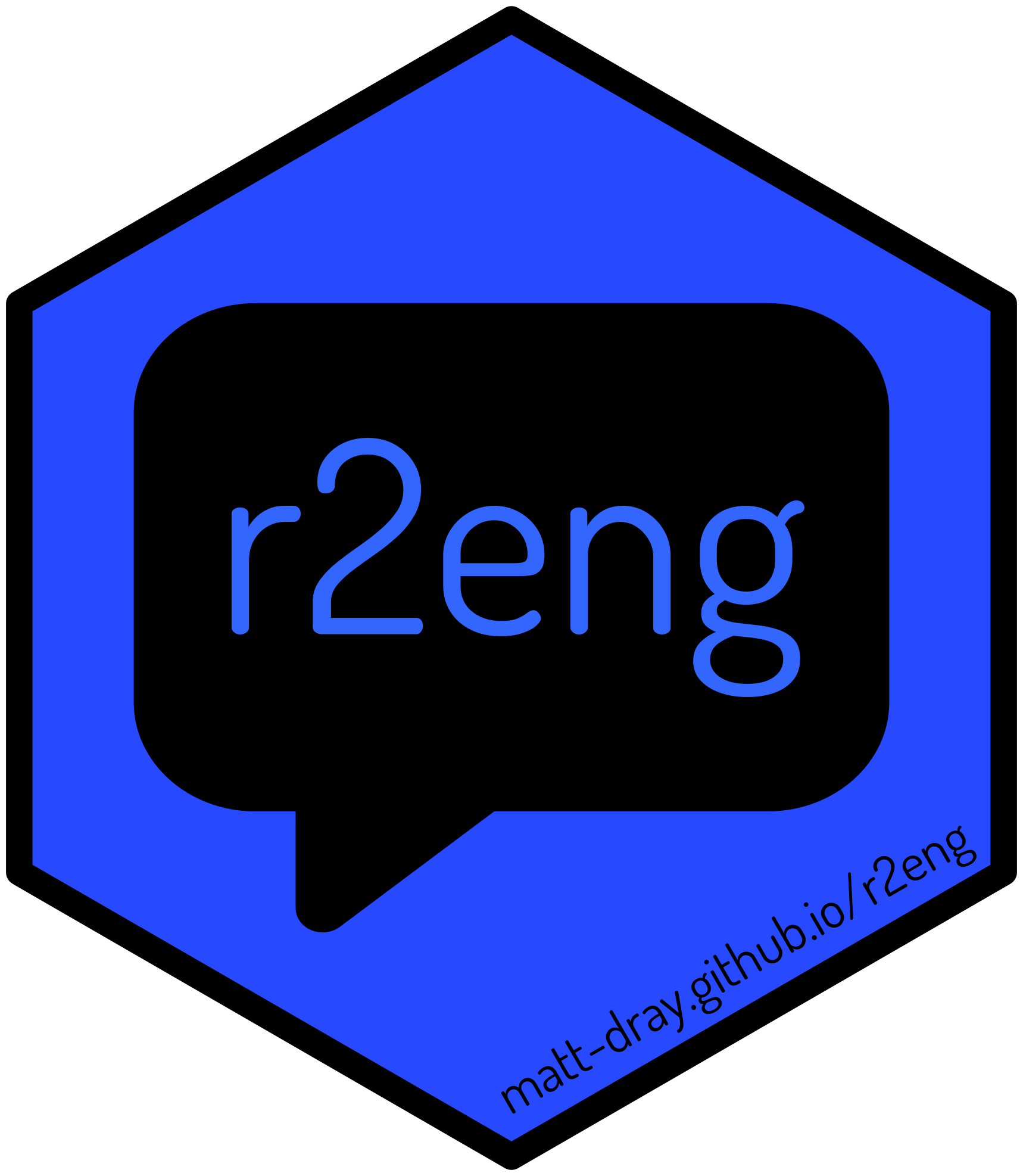https://github.com/matt-dray/r2eng
:speaking_head::speaker: R package: translate R to English
https://github.com/matt-dray/r2eng
accessibility communication rstats rstats-package
Last synced: 6 months ago
JSON representation
:speaking_head::speaker: R package: translate R to English
- Host: GitHub
- URL: https://github.com/matt-dray/r2eng
- Owner: matt-dray
- License: other
- Created: 2020-07-12T14:24:02.000Z (over 5 years ago)
- Default Branch: master
- Last Pushed: 2024-05-07T18:38:14.000Z (over 1 year ago)
- Last Synced: 2025-07-02T13:59:56.425Z (6 months ago)
- Topics: accessibility, communication, rstats, rstats-package
- Language: R
- Homepage: https://matt-dray.github.io/r2eng/
- Size: 165 KB
- Stars: 19
- Watchers: 2
- Forks: 5
- Open Issues: 9
-
Metadata Files:
- Readme: README.Rmd
- Changelog: NEWS.md
- License: LICENSE
- Code of conduct: CODE_OF_CONDUCT.md
Awesome Lists containing this project
- jimsghstars - matt-dray/r2eng - :speaking_head::speaker: R package: translate R to English (R)
README
---
output: github_document
---

```{r, include = FALSE}
knitr::opts_chunk$set(
collapse = TRUE,
comment = "#",
fig.path = "man/figures/README-",
out.width = "100%"
)
```
# {r2eng}
ɑː ˈtuː /eng/
[](https://www.repostatus.org/#wip)
[](https://github.com/matt-dray/r2eng/actions)
[](https://codecov.io/gh/matt-dray/r2eng)
[](https://mybinder.org/v2/gh/matt-dray/try-r2eng/master?urlpath=rstudio)
Make R speakable!
The goal of {r2eng} (as in 'R to English') is to take an R expression and 'translate' it to an English sentence.
The package is intended (optimistically) to:
* improve communication between teachers and learners
* make R discussions in English more accessible to non-English speakers
* provide an extra audio evaluation tool for users who are blind or have low vision
* be of interest to any R user that's curious about how R expressions might be vocalised
The project was inspired by [Amelia McNamara](https://twitter.com/AmeliaMN)'s useR! 2020 talk called 'Speaking R' ([YouTube](https://www.youtube.com/watch?v=ckW9sSdIVAc), [slides](https://www.amelia.mn/SpeakingR/#1)).
This project is a work in progress and highly opinionated. Contributions are welcome, but please see the [Code of Conduct](#conduct).
## Installation
You can install the development version of {r2eng} from GitHub with:
```{r install, eval=FALSE}
remotes::install_github("matt-dray/r2eng")
```
This package depends on {rlang}.
## Examples
The main function in the package is `translate()`. It uses [non-standard evaluation](http://adv-r.had.co.nz/Computing-on-the-language.html), so you pass it a bare R expression like this:
```{r example-basic}
r2eng::translate(variable <- 1, speak = FALSE)
```
Set `speak = TRUE` for a system call that will read the English sentence out loud (macOS only).
A more complex example:
```{r example-complex}
obj <- r2eng::translate(
hello <- c(TRUE, FALSE, 'banana' %in% c('apple', 'orange')),
speak = FALSE
)
obj
```
### Methods
An `r2eng` object has the methods `speak` and `evaluate`.
Use `speak` to launch a system call that will vocalise the translated English sentence for the given R expression (macOS only).
```{r example-speak}
r2eng::speak(obj)
```
Use `evaluate` to evaluate the expression.
```{r example-eval}
r2eng::evaluate(obj, speak = FALSE)
hello
```
Use `print` to print the R expression and English sentence.
```{r example-print}
print(obj)
```
From your r2eng object you can access the original R expression (`r_expression`), English translation (`eng_expression`), quoted expression (`quoted_expression`). You can also access the parse tree output (`translation_map`):
```{r example-map}
head(obj$translation_map)
```
### Further examples
Here's an example using the pipe (`%>%`) and two types of 'equals':
```{r example-pipe-equals}
library(magrittr)
r2eng::translate(
mtcars %>% filter(mpg > 22) %>% mutate(gear4 = gear == 4),
speak = FALSE
)
```
This example uses the 'plus' constructor from {ggplot2}:
```{r example-ggplot}
r2eng::translate(
ggplot(diamonds, aes(x=carat, y=price, color=cut)) + geom_point() + geom_smooth(),
speak = FALSE
)
```
This example shows what happens when you pass vectors:
```{r example-vectors}
r2eng::translate(
plot(x = c(1, 2, 3), y = c(5, 6, 7)),
speak = FALSE
)
```
### Passing a string
The `translate()` function understands the meaning of `=` when used for assignment versus specifying arguments, but feeding an expression such as `x = c(1, 2, 3)` would confuse `translate()` that you want to pass an argument `c(1, 2, 3)` to the parameter `x`.
This is because `translate()` uses [non-standard evaluation](http://adv-r.had.co.nz/Computing-on-the-language.html).
In such cases, you must use `translate_string()` instead:
```{r example-basic-string}
r2eng::translate_string("x = c(1, 2, 3)", speak = FALSE)
```
Another exceptional case for `translate_string()` is when piping and expression:
```{r example-string-pipe}
"non_english <- c('ceci n est pas une pipe', 'Ich bin ein Berliner', '我其實唔識講廣東話')" %>%
r2eng::translate_string(speak = FALSE)
```
## RStudio addin
Installing this package also installs an [RStudio addin](https://rstudio.github.io/rstudioaddins/).
Select an R expression in the editor and then under 'Addins', go to 'Speak R Expression In English' under 'R2ENG'. The selected text will be spoken by your computer.
You could bind this addin to a keyboard shortcut in RStudio by going to 'Tools', then 'Modify Keyboard Shortcuts...'. Perhaps Cmd + Shift + V.
As with the rest of this package, vocalisation is only possible for macOS and with speakers.
Another Addin function is also available, 'Print R Expression In English', which prints a selected R expression and its English translation
## Contributions and Code of Conduct {#conduct}
Contributions are welcome from everyone. Please first [add an issue](https://github.com/matt-dray/r2eng/issues) if a relevant one one doesn't already exist.
Please note that the {r2eng} project is released with a [Contributor Code of Conduct](https://contributor-covenant.org/version/2/0/CODE_OF_CONDUCT.html). By contributing to this project, you agree to abide by its terms.